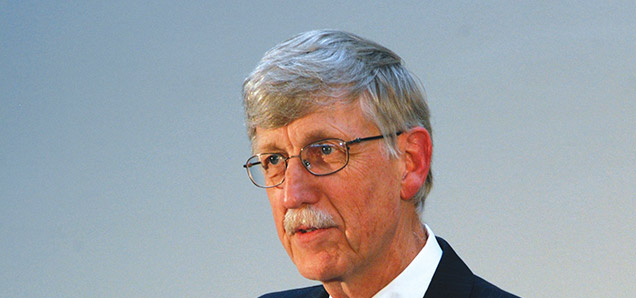Rumours of Grace: In the space between knowledge and desire
 CREDIT: "FRANCIS COLLINS 1" BY ADAM FAGEN ON FLICKR (CC BY-NC-SA 2.0) / DESATURATED
CREDIT: "FRANCIS COLLINS 1" BY ADAM FAGEN ON FLICKR (CC BY-NC-SA 2.0) / DESATURATEDFrancis Collins, leader of the Human Genome Project, considers himself a serious Christian.
Faith and science don’t mix, do they? Faith is believing the unbelievable, and science is discovering what is knowable. At least, this is how many see the two. It is common for people who dismiss Christianity to claim it is a fabrication that uninformed or gullible people believe. They say that informed people, if they follow their reason, naturally reject Christianity. Those who do are sometimes called brights by their atheist cheerleaders – not without a strong trace of nose-turned-up arrogance.
Is it really true that Catholics, Protestants, Muslims, Satanists, Rastafarians, Hindus and any others who believe in God or other (usually) unseen beings are irrational and unscientific? And are people of science characteristically against faith in God? Absolutely not.
Anyone reading this can go online and discover current, prominent scientists who are also deeply faithful. Francis Collins, head of the Human Genome Project, and John Polkinghorne, physicist and Anglican priest, are two easily accessible people who write that their faith enriches their science and that their science enriches their faith.
The film Salmon Fishing in the Yemen was probably not made to promote Christian faith. Yet, in this scene, the alleged gap between faith and reasoned science appears to vanish. In the story, Sheik Muhammed (Amr Waked) dreams of building a waterway in Yemen and stocking it with salmon so his people can fly fish. He enlists businesswoman Harriet Chetwood- Talbot (Emily Blunt) and fish expert Dr. Alfred Jones (Ewan McGregor) to help him.
They discuss their venture over a formal dinner. The sheik claims that if the project succeeds it will be a miracle of God. Jones takes this opportunity to state that he is not a religious man, but a man of facts and figures.
The sheik does not let him get away with this. In the conversation that ensues Jones reveals that he spends dozens, sometimes even hundreds, of hours fishing before he catches anything. Muhammed points out that Jones endures wind, rain and cold even when the odds of success are low. “Why? Because you are a man of faith, Dr. Alfred. In the end you are rewarded for your faith and constancy with a fish!”
Jones disagrees, but the sheik overrides his disagreement with a toast to faith and fish. Chetwood-Talbot joins in the toast. Jones does too, but adds, “[and to] science.”
The sheik though has already made his point. It turns out that Jones does not live by facts, figures and science alone. He also knows faith, although he hasn’t bothered to think about it much, believing himself to be above that sort of thing. And, although faith that he will eventually catch a fish is not exactly the same as faith in God, there are plenty of similarities.
Faith involves waiting, constancy and patience. Fly fishermen have faith that if they wait long enough, a catch worth bragging about will come along. Christians have faith while they wait at times for answers to their prayers. And, while waiting for the return of Christ and the renewing of the world, they trust that those things will not be withheld forever. Those who believe in Jesus Christ have faith that in spite of the criticisms that some have lodged against the accounts of his death and resurrection, which will be celebrated this Easter holiday. They are nevertheless true, so much so that all other opposing truths will one day be revealed as shadowy, if not sinister, imposters.
These, and other similarities between faith in a catch and faith in God, suggest that many are not far from the ability to believe in God. More of us would, I think, with a little encouragement.
A final nod to the toast – and to science – from our man of facts and figures. For science too involves faith. Did Copernicus and Galileo not have faith that their painstaking observations of the stars would yield remarkable and powerful truths? And didn’t Thomas Edison have faith that if he experimented long enough that he would invent a light bulb that would not explode when he turned it on and give light stronger than the gentle candlelight by which he must often have worked?
Human beings were made to live in the space between what is known and what is hoped for; between what is understood and what is desired. In that territory faith is the vehicle to carry us.
It carried Edison’s team until a working light bulb was invented. It carries forward the people teaching classes, reading books and preparing for exams. And it carries people along the journey where the death and resurrection of Jesus Christ are the signposts of a new age to come that has already broken out upon the world.
Editorial opinions or comments expressed in this online edition of Interrobang newspaper reflect the views of the writer and are not those of the Interrobang or the Fanshawe Student Union. The Interrobang is published weekly by the Fanshawe Student Union at 1001 Fanshawe College Blvd., P.O. Box 7005, London, Ontario, N5Y 5R6 and distributed through the Fanshawe College community. Letters to the editor are welcome. All letters are subject to editing and should be emailed. All letters must be accompanied by contact information. Letters can also be submitted online by clicking here.













